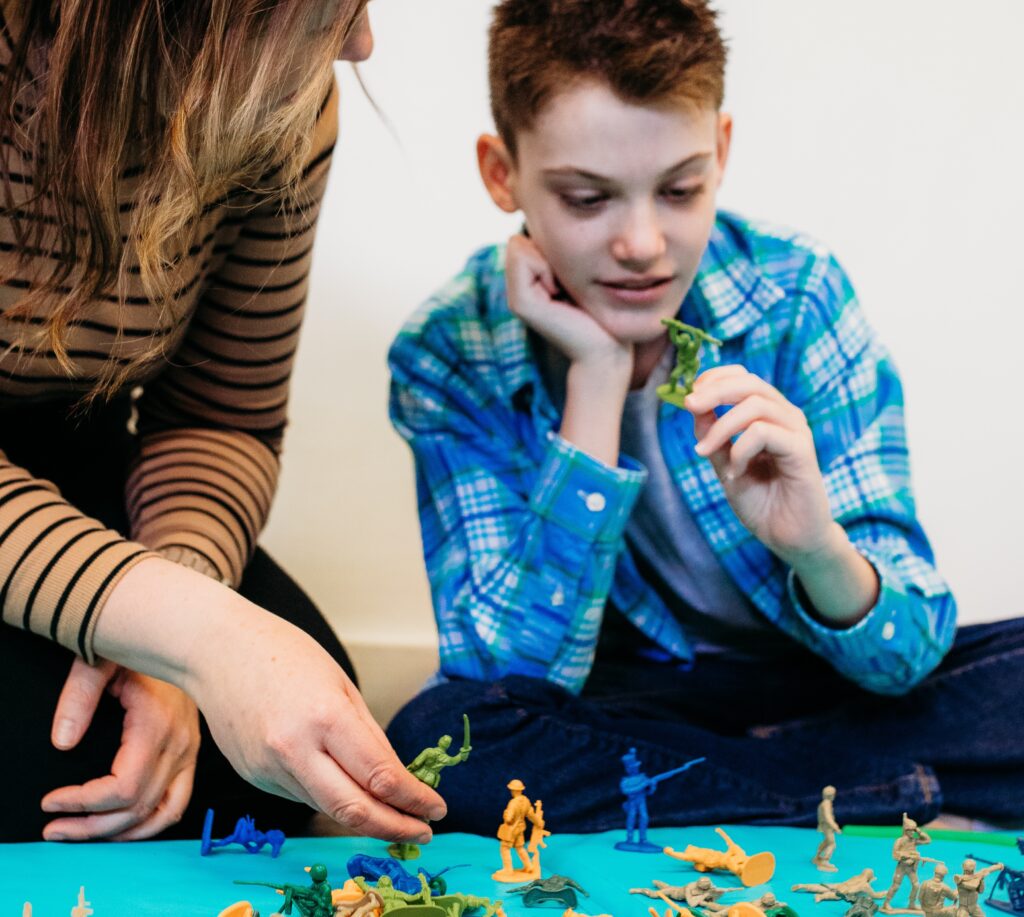When children face emotional, social, or developmental challenges, it’s not always easy for them to express what they’re feeling or experiencing. This is where play therapy comes in. At Puzzle Pieces, we believe in the power of play to foster connection, support emotional growth, and help children thrive. Our therapists engage children through intentional, child-led play to promote meaningful development in a way that feels natural, safe, and enjoyable. In this blog, we’ll explore how play therapy works, its many benefits, and how it can support your child’s growth both in and outside of the therapy room.
What is play therapy?
Play therapy is a developmentally appropriate therapeutic approach specifically designed for children. At Puzzle Pieces we use a DIRFloortime® approach, where play is intentional and guided by the child’s interests, allowing the therapist to join their world, foster connection, and expand their capacity for engagement, problem-solving, and social-emotional growth. This is an evidence-based approach for supporting children with Autism and other developmental issues.
How does play therapy differ from traditional talk therapy for children?
Unlike traditional talk therapy, which often relies on verbal communication, play therapy uses toys, games, art, and imaginative play as primary tools for expression. Children naturally communicate and process their emotions through play, making it a powerful vehicle for building connections, exploring feelings, and working through challenges.
How does play therapy support emotional regulation and self-expression in children?
Play therapy creates a safe and supportive environment where children can explore big feelings in a way that feels natural to them. Through play, children can act out scenarios, practice coping strategies, and develop skills for managing overwhelming emotions.
The DIRFloortime® approach used at Puzzle Pieces emphasizes co-regulation, where the therapist or caregiver helps the child regulate their emotions by meeting them in their current emotional state. Over time, children develop internal strategies for calming themselves and managing frustration, anxiety, or sensory overload.
In what ways can play therapy help children develop social skills and build meaningful relationships?
The DIRFloortime® model emphasizes shared experiences as a foundation for relationship-building. Children develop trust, flexibility, and confidence in their social interactions by engaging in joyful, meaningful interactions.
How does play therapy benefit children who struggle with anxiety, ADHD, or sensory processing challenges?
Children with sensory processing challenges often experience the world as overwhelming or confusing. Play therapy provides opportunities for sensory exploration in a controlled and responsive setting, allowing children to develop coping strategies and build tolerance for sensory experiences. When using the DIRFloortime® approach, therapists are attuned to each child’s unique sensory profile and adapt play interactions to ensure the child feels regulated and engaged.
The DIRFloortime® model emphasizes shared experiences as a foundation for relationship-building. Children develop trust, flexibility, and confidence in their social interactions by engaging in joyful, meaningful interactions.
How is play therapy helpful for children with autism? How is it adapted to meet their needs?
For example, a child who prefers solitary play may be gently encouraged to expand their interactions with a trusted adult before introducing peers. Children who rely on routines may experience flexible play scenarios to build resilience and problem-solving skills. By respecting the child’s differences and creating a supportive environment, play therapy helps neurodivergent children build confidence and connection.
What role do parents play in supporting play therapy at home?
For example, a child who prefers solitary play may be gently encouraged to expand their interactions with a trusted adult before introducing peers. Children who rely on routines may experience flexible play scenarios to build resilience and problem-solving skills. By respecting the child’s differences and creating a supportive environment, play therapy helps neurodivergent children build confidence and connection.
What advice would you give to parents considering play therapy for their child?
It is also important to be patient and trust the process. Play therapy is child-led, meaning growth may feel gradual but it is designed to build strong, lasting skills. While play may seem simple, it’s often a vehicle for profound emotional and social growth. The most important piece of advice we have is to stay involved. Your role in supporting your child’s learning through play at home is invaluable to the process and their growth.
Puzzle Pieces is a DIR® accredited organization and several of our clinicians across disciplines have obtained additional certification as DIRFloortime® providers. This philosophy for interacting with children is embedded in our approach to intervention within all of our therapeutic services. Contact us today to learn more about how we can support your child and your family.

